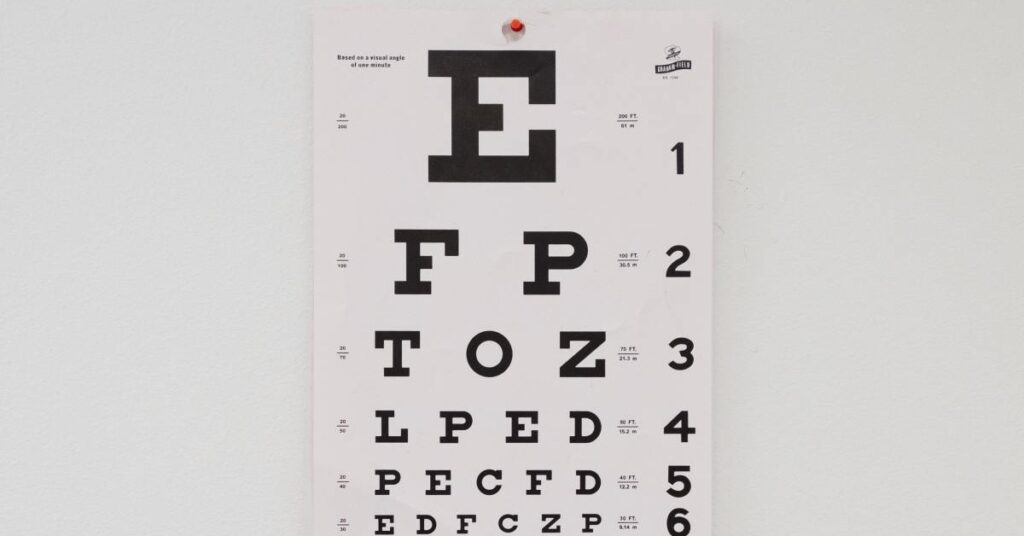
Why Become a Sports Vision Optometrist?
Sports vision optometrists work with patients at all levels, including [...]

Are you considering a career in optometry? While taking the first step can seem intimidating, there are many compelling reasons to enter this profession. The US Bureau of Labor Statistics (BLS) projects ten percent growth in the optometry job market from 2021 to 2031, five percent faster than the average for all occupations. And promising job prospects are just the tip of the iceberg when it comes to the potential benefits.
The American Diabetes Association recommends getting an eye exam annually, because doing so can help prevent 95 percent of vision loss caused by diabetes—a disease that affects many parts of the body. Indeed, eyesight can provide insight into a patient’s holistic health, making it an important part of collaborative healthcare. Eye exams can help detect brain tumors, cancer, heart disease, lupus, Lyme disease, multiple sclerosis, and others. In total, a comprehensive eye exam can help uncover at least 276 systemic diseases.
Optometric care is accessible to 99 percent of the population in the US—distinguishing it as a uniquely available and important healthcare resource. Optometrists provide an astounding 85 percent of primary eye care in the US, according to the American Optometric Association (AOA). If this sounds like the kind of comprehensive and crucial care you’d want to provide as a future optometrist, you’ll need information to get started. This article explores:
Optometrists and their MD-holding ophthalmologist colleagues are important contributors to disease detection and overall health promotion. Their value is reflected in healthy job growth and six-figure average annual salaries. With 121 percent growth in job postings from 2019-2022, optometry placed second behind registered nurse on Indeed.com’s list of the best jobs in the US. US News & World Report lists optometrists’ median annual salary as $118,050 for 2020, with the top 25 percent of earners averaging $145,720 median annual salary.
Growth in demand and salary are part of the picture, but how do people feel about optometry as a career? A quick look at some Reddit commenters seems to confirm that it’s a satisfying, challenging, and rewarding career choice. One commenter begins, “I very much enjoy my job. I enjoy the patient interactions, the relatively low stress levels, and the ability to improve the quality of life for patients,” but added that this career path was not for everyone. Most commenters agree that you should only pursue optometry if you love the work and are happy working closely with patients. Some recommend setting up a private, full-scope practice to keep the work interesting. The challenge and reward can be found in diagnosing all different kinds of eye conditions, not just prescribing medicated drops and writing prescriptions for contact lenses and glasses all day.
Optometry comes with a unique list of pros and cons. One Reddit commenter sums up their list of positives this way: “People don’t hate coming to see us like they hate the dentist.” But a career in vision care has plenty more to love (and a few things not to love) for optometrists working in the industry. We’ll dive into some of them here.
The Bureau of Labor Statistics (BLS) projects healthy growth for optometry. An aging baby boomer population should create greater need for geriatric eye care to test for glaucoma, cataracts, and age-related macular degeneration. Rural populations are in greatest need of optometrists. Practitioners can also find a low cost of living in non-metropolitan parts of the country.
The cost for a Doctor of Optometry at the Herbert Wertheim School of Optometry and Vision Science at Berkeley is nearly $28,000 per semester for out-of-state residents. Living expenses are estimated to tack on another $21,000 per semester to the price tag. Tuition and cost of living will vary for each optometry program, but it’s clear that obtaining an education in optometry isn’t cheap.
The high cost of getting a Doctor of Optometry is met, however, with a solid return on investment. Indeed.com lists the average base annual salary for an optometrist in the US just above $124,000, and US News reports a spread from $91,180 average base annual salary for the lowest paid 25 percent to $145,720 average base annual salary for the highest paid 25 percent. While the investment is steep, grads have a good chance of paying off education loans with their future paychecks.
The most interesting and challenging part of being an optometrist is the variety of cases that can make up a workday. In a hospital setting or in concert with other specialists, an optometrist can see a variety of unique eye conditions from patients of all ages. Practitioners can follow their interests and specialize in areas like pediatric care, low-vision rehabilitation, ocular disease, pre- and post-op management, and family practice.
While your goal may be to build a career full of interesting cases, there are some optometrists who complain of the monotony of the corporate setting and of constantly referring patients to opticians for eyeglasses and writing prescriptions for contact lenses. But with specializations offered to optometry students and with a variety of practice settings, practitioners can avoid ending up in a dull or repetitive work environment.
Optometry comes with an uncommonly healthy work/life balance. Full-time work is typically done during the work week, with very few medical emergency calls to pull practitioners in after hours. Some optometrists open their own practices and are able to control their schedule completely. The challenges of this fairly low-stress job can be mostly left at the office/clinic/hospital, allowing time off to really feel like time off.
Achieving your DO usually takes four years of full-time study on top of prerequisites met with a bachelor’s degree. You also need successful results on the Optometry Admission Test (OAT). The OD degree program at the New England College of Optometry (NECO) outlines a path to practice that is chock-full of coursework, board exam prep, and direct patient care through rotations and externships. Licensing requirements and processes are different for each state and must be maintained. That said, the investment in time can prove well worth the effort.
If you are not in an interdisciplinary environment, work can get lonely. Many healthcare providers like to work with others in a hospital or clinic setting. This allows them to collaborate with ophthalmologists and other primary care doctors on difficult cases and to receive professional support in the workplace. Research positions or work in rural private practices may feel solitary while still requiring optometrists to be at their best for their patients.
Optometrists generally feel theirs is a rewarding career, particularly when it comes to helping patients regain vision and function. Many optometrists go into the field to help people and find diagnosing and treating eye diseases an interesting and fulfilling challenge. They report high levels of job satisfaction when improving their patients’ quality of life with vision therapy. This often leads to developing lasting and positive relationships with patients.
Fall of 2023 is the projected launch date for a collaborative effort between education tech leader Noodle and the oldest continuously operating optometry school in the US, the New England College of Optometry (NECO). The partnership will allow hands-on training in a hybrid format through online coursework in combination with local clinical experiences.. This new application will allow increased access for students in rural areas.
As Noodle and NECO pursue accreditation for their hybrid program, they are likely to provide a model for future hybrid optometry degree programs at other schools. Growth in online education continues to expand with new technologies and applications. With accessibility reaching further than ever before, you could be one of the first to take part in this transformative optometric endeavor.
(Last Updated on February 26, 2024)
Questions or feedback? Email editor@noodle.com

Sports vision optometrists work with patients at all levels, including [...]

American students can choose from among 24 accredited Doctor of [...]

Roughly one in four optometry students pursue a residency after [...]

Forensic optometrists employ optometric science to assist the police in [...]

Admission to any of the 23 accredited optometry programs in [...]
Categorized as: Optometry, Nursing & Healthcare